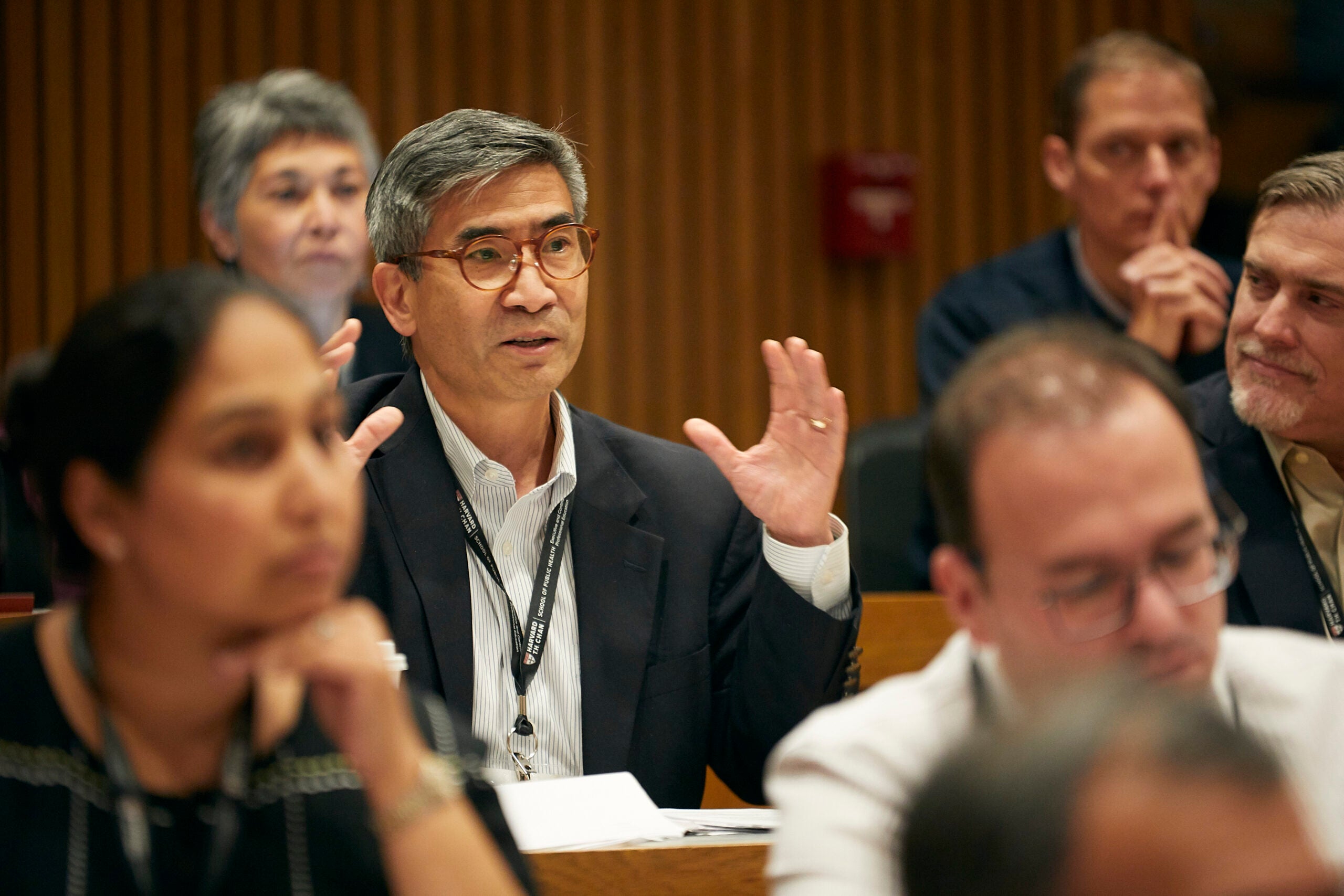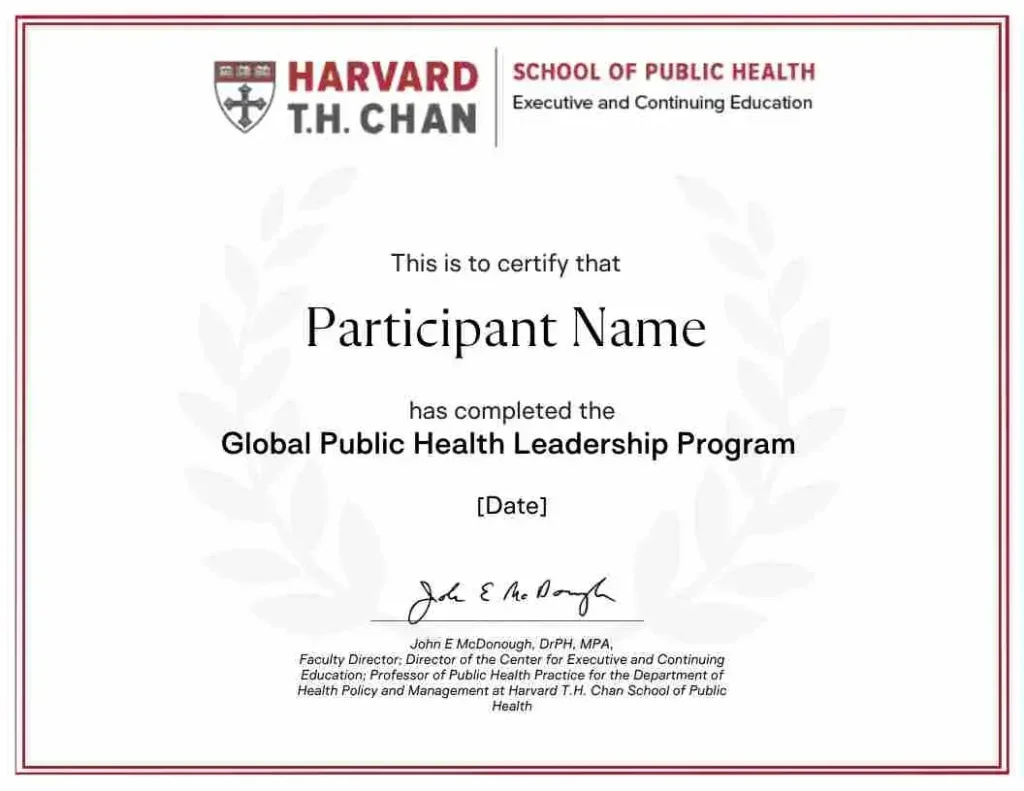Leadership Development for Physicians in Academic Medical Centers
“The level of instruction was unparalleled—engaging faculty conveyed valuable concepts in a clear way. I will be able to go back to work and immediately begin implementing the things I learned here.”
—Lakedra Pam, MD, Director of Inpatient Obstetrics, Boston Medical Center

Upcoming Program Information
View detailed information for the upcoming program
-
Leadership Development for Physicians in Academic Medical Centers (Hybrid)
This hybrid program involves online and on-site sessions that bring together physicians in administrative positions at academic medical centers for an intensive and systematic study of the critical leadership and management issues facing academic medical centers.
Program Fees
- Standard Price $9,500.00
-
Leadership Development for Physicians in Academic Medical Centers (On-Site)
This 2-week on-site program brings together physicians in administrative positions in academic medical centers to Harvard’s Longwood Campus for an intensive and systematic study of the critical leadership and management issues facing academic medical centers.
Program Fees
- Standard Price $11,200.00
Program Overview
Strategic Leadership Development for Physician Leaders in Academic Medical Centers
In recent years, physician leaders have confronted many challenges within their healthcare systems, such as burnout among physician staff, difficulties in retaining talent, an increased emphasis on the financial aspects of patient care, resources that are diminishing alongside commercial considerations, and the aftermath of a pandemic. These challenges necessitate a delicate balance between urgent demands and an unwavering dedication to patient care. This complex landscape prompts an essential question: How can frontline physicians develop into the leaders needed by both their organizations and their patients?
For over 40 years, Harvard has conducted Leadership Development for Physicians in Academic Medical Centers, an executive development program designed specifically to help answer this enduring question. This program—available in On-Site and Hybrid formats—convenes medical directors and chiefs of divisions from academic medical centers together with an interdisciplinary faculty team for an intensive systematic study of the critical leadership and management issues faced by physicians in administrative positions and academic medical centers. In the current healthcare climate, this includes topics like:
- Burnout: Physician leaders are increasingly worried by their team’s burnout, but how do they respond to their increasing burnout rate?
- Encroachment of the Business of Healthcare: Physicians are spending more time with administrative and financial tasks than on patient care, expanding the ongoing conflict between clinical and financial viewpoints.
- Diminishing Resources: Shrinking budgets make resources scarcer exacerbating a culture scarcity.
- Higher Patient Expectations: An aging population and new technologies—including generative AI—require healthcare providers to guide often-misinformed patients.
Curriculum
The program curriculum is organized around the following interrelated courses taught by a faculty experienced in executive education for physicians and other key decision-makers in the health system:
- Competitive Strategy
- Financial Analysis
- Operations Management
- Organizational Issues
- Conflict Resolution and Negotiation
- Leadership
- Healthcare Policy
A carefully integrated curriculum enables participants to examine fundamental leadership and managerial issues from the perspective of several disciplines.
Objectives & Highlights
The program’s overall objective is to enhance and develop participants’ leadership abilities and effectiveness. This is accomplished by providing an increased understanding of their responsibilities as leaders, perspective on the critical leadership and management issues they face, and understanding and awareness of concepts and techniques relevant to management.
Upon completion of the program, participants will have gained:
- Increased understanding of the responsibilities and tasks of leaders in complex institutions
- Broader appreciation of the challenges and changes occurring in academic medical centers and the implications for their own institution and service or area of responsibility
- New perspectives on issues they face currently and on those which arise in the future
- Knowledge of relevant concepts and techniques in several key management disciplines
- New methods to analyze problems and an enhanced capacity to identify the critical questions
- Greater effectiveness as unit and institutional leaders in formulating and implementing initiatives and managing change
The principal method of instruction in the program is the case method, a technique pioneered and refined at the Harvard Business School. Most of the cases present actual problem situations familiar to physicians in administrative positions at academic medical centers.
The case method confronts the participant with an actual management problem, halted at a point where decisions must be made, and empowers the participant to choose a course of action.
Participants go through a three-step study process. First, participants study each case independently. Then they meet in small discussion groups to test their individual analysis against those of their peers. Lastly, the entire class discusses the case, with the professor as a catalyst and guide. The professor points out considerations the class has overlooked; elicits from participants the lessons of experience; pursues each line of investigation to its conclusion; and finally, summarizes the discussion and draws out the major lessons it has taught.
Assigned readings and guest lecturers supplement and augment the use of cases. In addition, an important part of the learning process occurs during the informal exchange of insights and experience among participants, and between participants and faculty.
Leadership Development for Physicians in Academic Medical Centers is available in two different formats:
- A 2-week on-site course in Boston, MA from October 4-16, 2026.
- A hybrid course—featuring online live, online self-paced, and on-site sessions—from March 13-June 14, 2026.
Both formats utilize the same expert curriculum, which has been intensively refined over 40 years, and constantly updated to reflect the evolving healthcare landscape. Interactive learning and networking is also a key component of both formats.
Certificate of Specialization
Advance your Career with a Certificate of Specialization
This program contributes to the 3-program Executive Leadership in Health Care Certificate of Specialization. Click here for more information.
